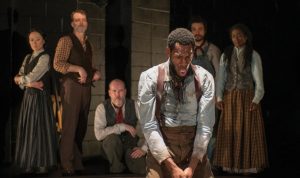 In the middle of Steel Hammer, an occasionally brilliant but also wayward show with music written by Julia Wolfe and performed by the Bang on a Can All Stars and SITI Company, Patrice Chevannes, playing the role of John Henry’s wife Polly Anne, sat still in center stage and told her story. She met a strong man named John in an overcrowded shack filled with migrant laborers during Reconstruction, and she knew — maybe before anyone else did — that John Henry was special. The joy and wonder of her solo tall tale lingered at the center of a busy performance that featured six actors, at least eight musicians, and the not always integrated writing of four playwrights.
In the middle of Steel Hammer, an occasionally brilliant but also wayward show with music written by Julia Wolfe and performed by the Bang on a Can All Stars and SITI Company, Patrice Chevannes, playing the role of John Henry’s wife Polly Anne, sat still in center stage and told her story. She met a strong man named John in an overcrowded shack filled with migrant laborers during Reconstruction, and she knew — maybe before anyone else did — that John Henry was special. The joy and wonder of her solo tall tale lingered at the center of a busy performance that featured six actors, at least eight musicians, and the not always integrated writing of four playwrights.
I’ve seen Chevannes a few other times recently, in Tamburlaine and Pericles, both at Theater for a New Audience. Her infectious smile, powerful presence, and dazzling stage charisma tend to steal the show, as she did again last night. I was also intrigued by Steel Hammer’s layered engagement with the folk tale and musical history of John Henry, who — according to research one of the characters presented early in the show — appears to have been either very short or very tall, from Alabama or Kentucky or Georgia or Elizabeth, NJ, or perhaps someplace else. Possibly a criminal, or maybe not. But we are sure that he’s the most famous American folk hero who’s African-American — and possibly the only folk hero who dies on the job.
At a certain point, when the actors were exhausting themselves running circles around the center stage for what seemed a very long time, I wondered if the performance might be trying to represent the experience of painful and tedious work — which is a tricky thing to perform. (My daughter, alas, just thought it was dull.)
I love the John Henry song, and its ambivalent celebration of the human heart struggling against the machine. I also enjoyed the music in this show, especially the inventive clarinet playing and percussion by the Bang on a Can All Stars, featuring Ken Thomson on clarinet. This show feels like a work in progress, though I guess it was at BAM last fall. It’s hard to stage painful work!
Leave a Reply